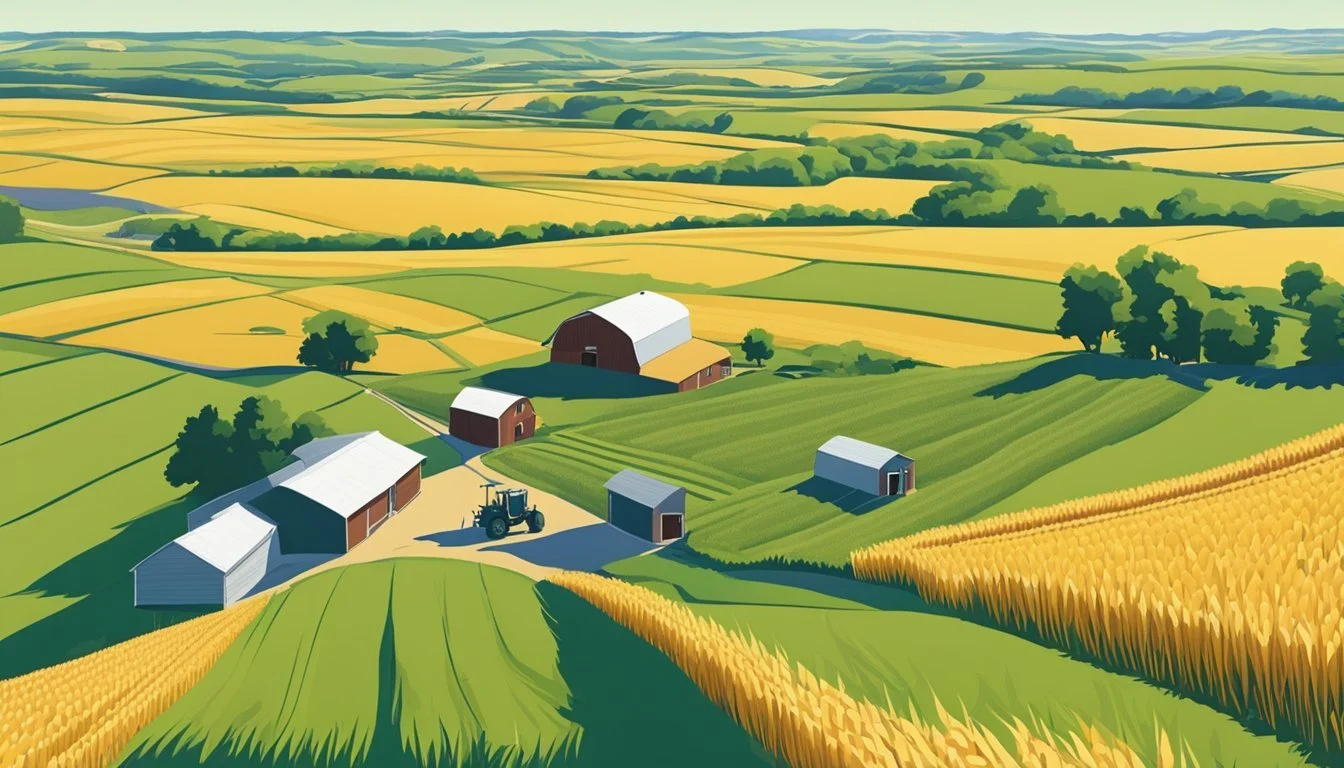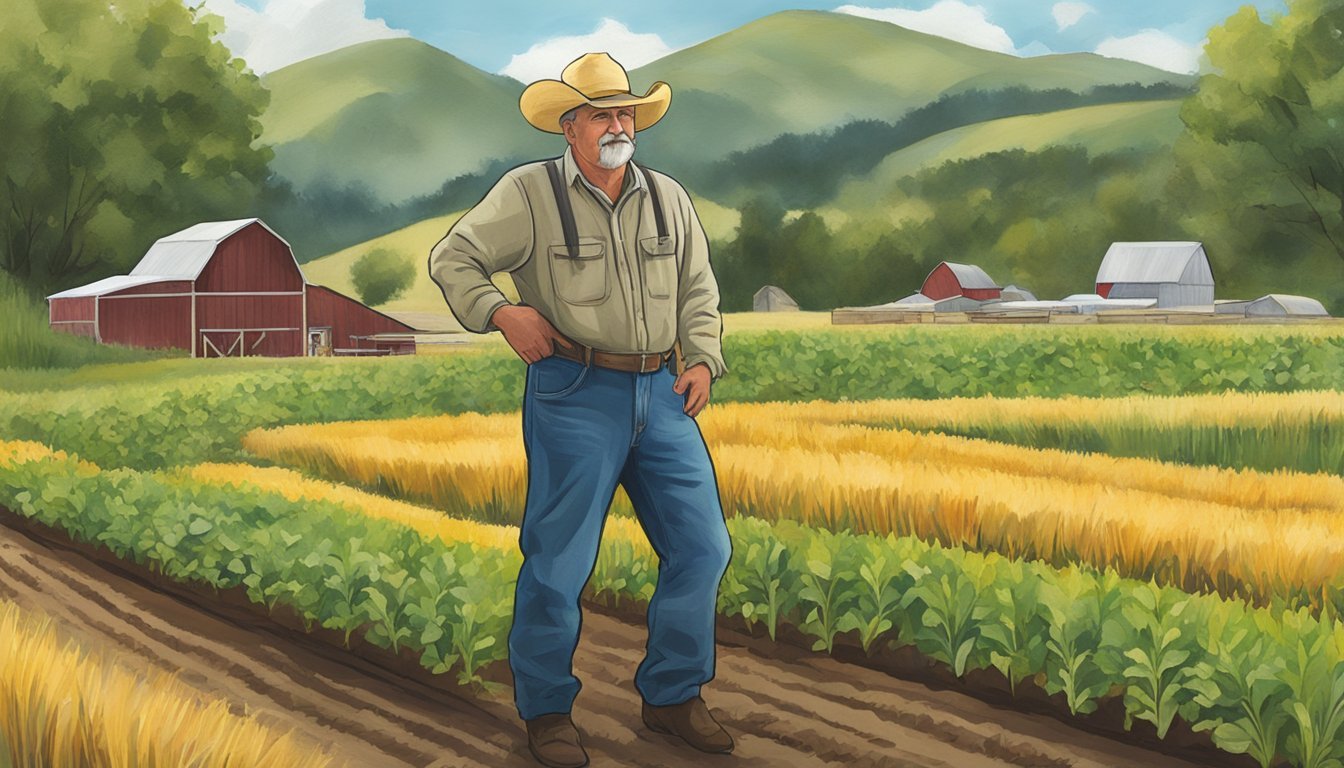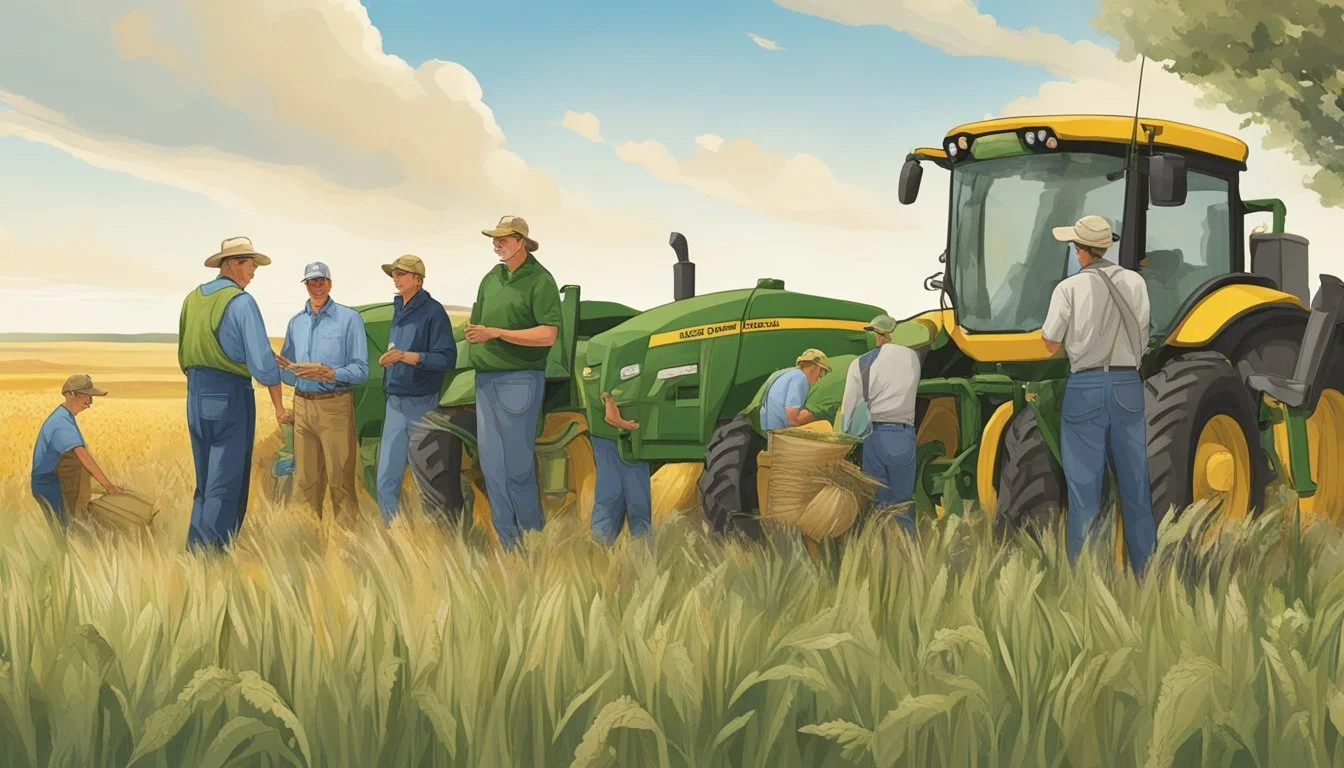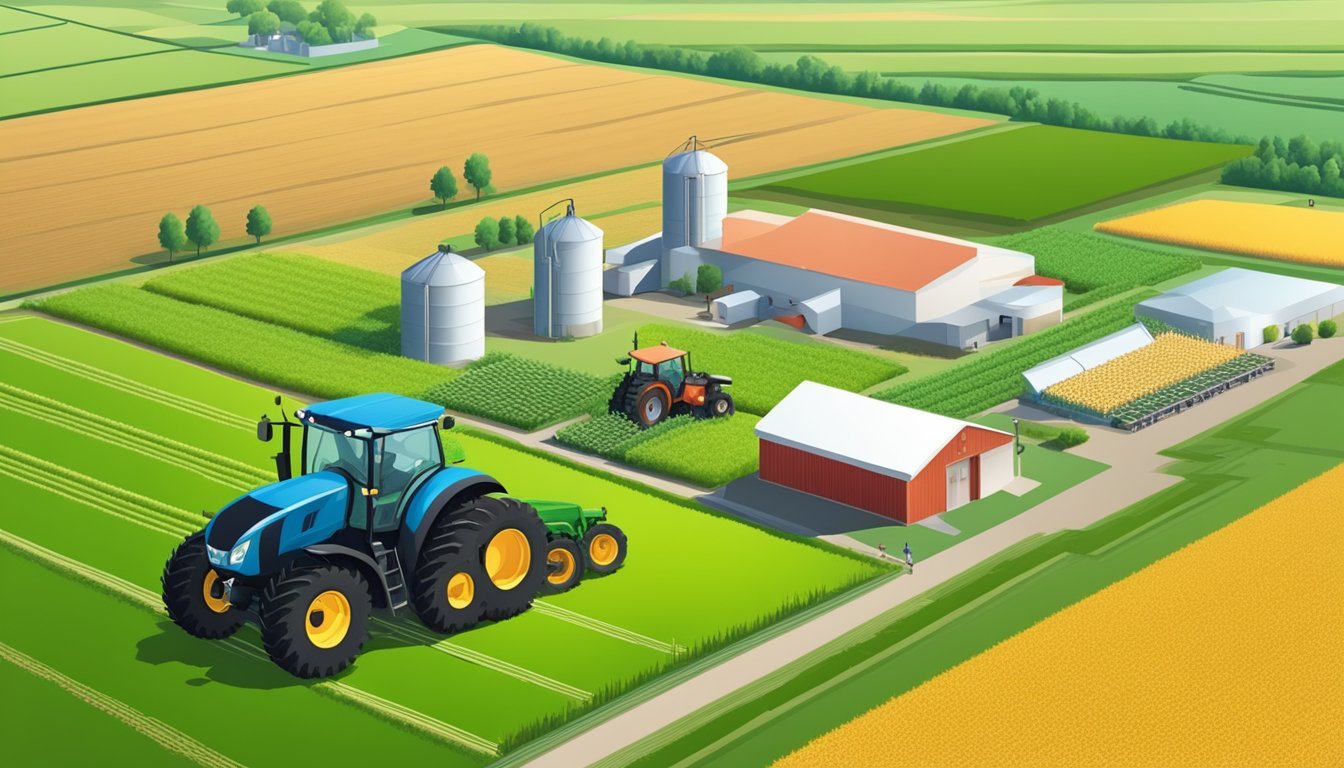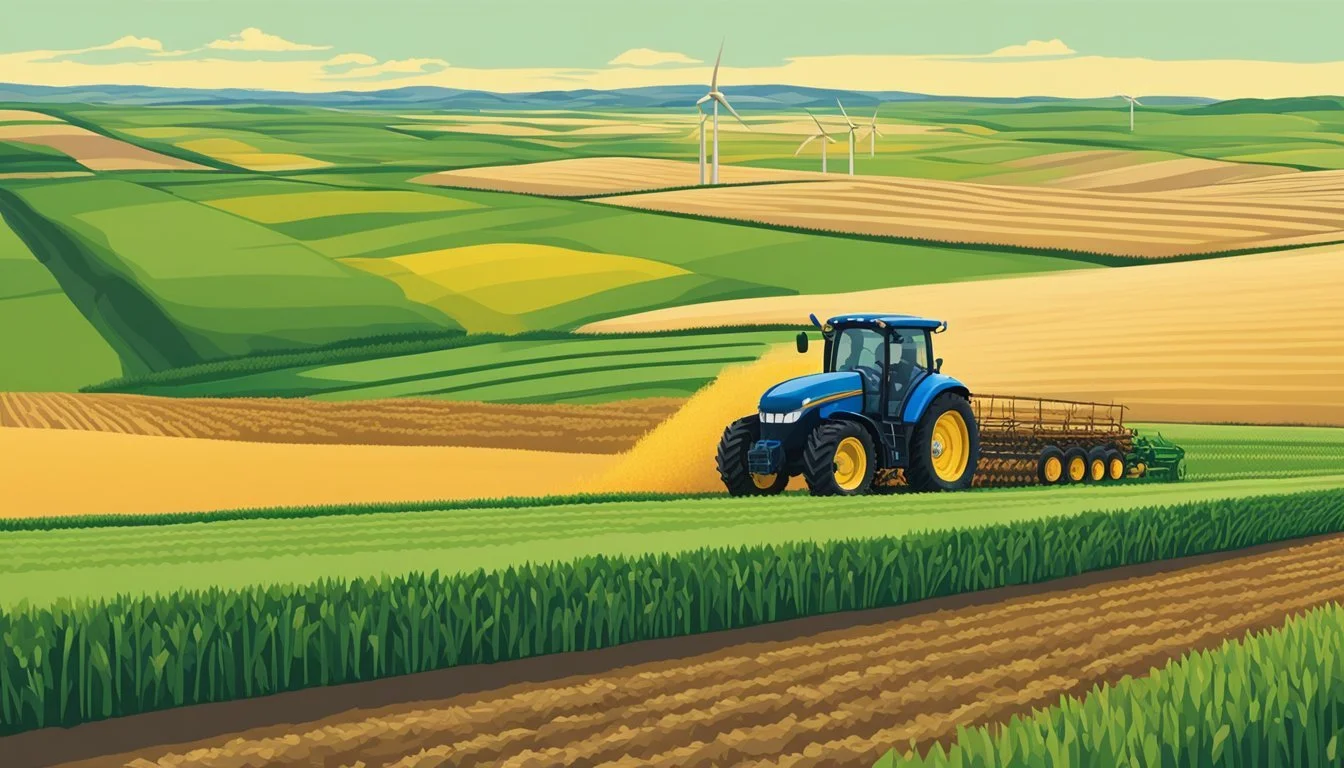Farming Grants North Dakota
Secure Your Agricultural Business Funding
North Dakota's agricultural sector is a critical pillar of its economy, with a diverse landscape that includes family farms, ranches, and value-added agricultural enterprises. Recognizing the importance of supporting this sector, various grants are available to those in the farming industry. These grants aim to promote agricultural research, education, and the implementation of innovative practices which are vital for the advancement and sustainability of agriculture in the state. They support a range of projects, from individual farmers and ranchers seeking to improve their operations to community-based agriculture initiatives that bolster local economies.
A multitude of grant opportunities are accessible for agricultural endeavors in North Dakota. Entities like nonprofits, businesses, and individuals can leverage these funds to enhance agricultural operations, increase economic viability, and stimulate rural development. Noteworthy programs include the Specialty Crop Block Grant Program, which seeks to boost competitiveness in specialty crops, and the Agriculture Diversification and Development Fund (ADD), dedicated to aiding new or expanding agricultural businesses that show potential economic benefits.
The spectrum of funding reflects a strong commitment to agricultural innovation and development. For instance, grants are not only aimed at traditional farming practices but also extend to cover climate-smart agricultural solutions and conservation efforts. Access to these grants is a significant resource for North Dakota’s agricultural community, providing financial support that helps farmers and ranchers to remain competitive in a challenging market while also paving the way for a more sustainable and profitable agricultural future.
Overview of Farming Grants in North Dakota
North Dakota provides various grants designed to assist farmers and ranchers in diversifying and developing their agricultural operations. These grants are aimed to enhance profitability, create jobs, and expand the state's agricultural economy.
Types of Farming Grants Available
North Dakota Department of Agriculture offers multiple grant programs to support agricultural producers:
Value-Added Producer Grants (VAPG): Helps producers with activities to generate new products, create marketing opportunities, and increase income.
Agriculture Grants: Include funding for a variety of agricultural needs such as agriculture research, education, and community agriculture projects.
Eligible recipients for these programs typically include:
Beginning farmers and ranchers
Agricultural businesses looking to expand or introduce value-added activities
The funds can be used for a range of purposes including, but not limited to:
Purchase of equipment and supplies
Marketing and advertising of agricultural products
Expansion of crop and feed production
Specific grant amounts and application criteria vary by program.
Agriculture Diversification and Development Fund
The Agriculture Diversification and Development Fund (ADD) is a key initiative by the state:
ADD was established to support new or expanding value-added agriculture businesses.
The goals are to demonstrate financial feasibility, enhance profitability for farmers and ranchers, and stimulate North Dakota's economy.
ADD provides opportunities through grants and interest buydowns.
Projects are evaluated based on their potential economic impact and contribution to agricultural diversity.
Eligibility and Application Procedures
This section provides detailed guidelines on determining grant eligibility, the application process, and the necessary documents and information for farmers in North Dakota.
Determining Eligibility for Grants
Eligibility for farming grants in North Dakota typically requires the applicant to be a resident of the state and engaged in an agricultural venture that contributes to the state's economy. Entities such as independent producers, agricultural producer groups, farmer- or rancher-cooperatives, and majority-controlled producer-based business ventures are often eligible. Projects should aim to enhance the competitiveness of specialty crops, demonstrate financial feasibility, or propose value-added agriculture business expansions.
How to Apply for Farming Grants
Applicants must follow specific steps when applying for grants:
Identify the Grant Program: Choose a grant program suitable for your agriculture-related project.
Review Application Dates: Note that some programs, like the Specialty Crop Block Grant Program (SCBGP), have defined application periods. For SCBGP, applications were accepted from December 6, 2023, to January 17, 2024.
Submission: Submit applications via the designated platform or send physical documents to the appropriate department within the application period.
Required Documents and Information
The essential paperwork and details necessary for grant application typically include:
Business Plan: An outline demonstrating the project's financial feasibility and projected enhancement to farm profitability.
Proof of North Dakota Residency: Valid identification or documentation confirming state residency.
Agriculture Resources Documentation: Evidence of ownership or access to necessary agricultural resources for the project.
Applicants are encouraged to gather this information meticulously to ensure a complete and timely application.
Financial Aspects of Farming Grants
In North Dakota, farming grants serve as financial catalysts aimed at increasing profitability and fostering economic growth within the agricultural sector. These grants are crucial for businesses seeking to expand, purchase necessary equipment, or offset operating expenses.
Understanding Grant Financing
Grants are non-repayable funds provided by entities like the Agriculture Diversification and Development Fund (ADD). They are specifically designed to support financially feasible value-added agriculture businesses. Eligibility criteria and funding limits are established to ensure only qualified applicants receive support. To provide insight:
Eligibility: Determined by factors such as the business type (e.g., cooperatives, producer groups).
Funding Limit: Grants may have a cap, influencing the scope of what can be financed.
Grant financing does not commonly require security or collateral, differentiating it from loans. However, specific terms, such as the use of funds for designated purposes, must be followed rigorously.
Operating Expenses and Capital Investments
Farming grants can cover two critical financial areas:
Operating Expenses:
They may include costs such as seed, feed, or labor needed for day-to-day operations.
Grants help maintain cash flow, ensuring farmers can meet financial obligations without compromising the business's viability.
Capital Investments:
For expenses like purchasing equipment, expanding facilities, or acquiring real estate.
Investments backed by grants often lead to better economic returns due to lower upfront costs.
Interest rate buydowns are sometimes a part of a grant package, which reduces the cost of borrowed capital, thereby lowering operating expenses and enhancing profitability. Fees are generally not associated with grant acquisition, but applicants should be aware of any administrative requirements or potential costs involved in the application process.
Grants have a significant impact on North Dakota's agriculture sector by reducing financial barriers, helping businesses expand, and supporting the state’s economy.
Agricultural Development in North Dakota
North Dakota is fostering significant growth in its agricultural sector through strategic investments that focus on infrastructure development, technical assistance, and environmental stewardship.
Supporting Infrastructure and Technical Assistance
Investments in agricultural infrastructure and the provision of technical assistance are crucial components driving the agricultural development in North Dakota. The Agriculture Diversification and Development Fund (ADD) plays a pivotal role in advancing the sector. It specifically targets value-added agriculture businesses, providing financial backing for those that are new or expanding. This fund enhances the agricultural market's infrastructure by offering grants and interest buydowns, which collectively create a more resilient and robust agricultural economy. The state's initiative consistently emphasizes generating jobs and enhancing profitability for farmers and ranchers, thereby assisting them in achieving long-term financial feasibility.
Technical assistance complements these infrastructural improvements by empowering producers with the necessary expertise and guidance to navigate the complexities of modern agriculture. This assistance includes access to the latest agricultural technologies, helping them to improve their operations and align with contemporary market demands.
Enhancing Environmental Stewardship
North Dakota places significant emphasis on environmental stewardship within its agricultural practices. A key aspect of this is the sustainable management and enhancement of soil health, which is critical for long-term productivity and environmental well-being. The shift towards advanced agricultural technology is part of a broader effort to promote more environmentally friendly farming practices.
Key entities such as the North Dakota Advanced Agriculture Technology Engine are at the forefront of this transition, aiming to amalgamate agricultural operations with innovative technologies that bolster efficiency while minimizing environmental impact. They work in conjunction with large agricultural companies, technology firms, and educational institutions to foster an ecosystem that supports sustainable agriculture. This holistic approach demonstrates North Dakota’s commitment to sustainability and underscores the potential for agriculture to develop in harmony with ecological conservation efforts.
Grant Management and Compliance
Managing grants within the agricultural sector in North Dakota involves navigating a complex set of regulations and codes, as well as maintaining scrupulous compliance to ensure the funding continues to support the intended projects effectively.
Navigating Regulations and Codes
Farmers and ranchers in North Dakota must be familiar with the specific regulatory requirements and codes that govern agricultural grants to avoid legal and financial pitfalls. Compliance with these regulations is overseen by the North Dakota Department of Agriculture and other governmental entities to ensure that commerce and agricultural practices remain within legal and ethical boundaries. Notable among these funds is the Agriculture Diversification and Development Fund (ADD), which mandates strict adherence to financial feasibility and the enhancement of profitability criteria.
Key Regulations for Grant Recipients:
Financial Feasibility: Grants like ADD require projects to demonstrate a sound financial plan.
Profitability Enhancement: Projects should clearly show potential to increase returns for the agricultural community.
Job Creation and Economic Growth: Prospects for employment and contribution to North Dakota's economy are critically assessed.
Maintaining Grant Compliance
Once a grant is awarded, organizations must comply with continuous reporting and administration requirements to remain in good standing. Failure to do so can result in forfeiture of the grant and repayment of funds. Therefore, they must document how the grant funds are being used and provide evidence that they adhere to both state and federal regulations. This involves regular submission of financial reports and audits to the grant-providing agencies.
Essential Compliance Practices:
Regular Reporting: Submission of periodic reports detailing the use of funds and project progress.
Financial Audits: Independent audits may be required to ensure appropriate use of grant money and corporate accountability.
Code Adherence: Operation within the scope of relevant agricultural and commerce codes is mandatory.
By diligently navigating the regulatory landscape and maintaining rigorous compliance structures, North Dakota's farmers and ranchers can effectively manage their grants, ensuring sustained support for their agricultural ventures.
Region-Specific Information and Resources
This section provides an overview of targeted grant opportunities and agricultural resources available to farmers across various regions of North Dakota.
Grants by North Dakota Regions
Within North Dakota, grants are disbursed with considerations of regional agricultural needs and diversity. The North Dakota Advanced Agriculture Technology Engine, coordinated by North Dakota State University, empowers the entire state, prioritizing innovations specific to the local farm and ranchlands that comprise nearly 90% of the state's terrain.
Eastern North Dakota: Focuses on crop agriculture due to the Red River Valley's fertile land.
Central North Dakota: Offers grants for mixed farming operations, supporting both crop and livestock production.
Western North Dakota: Targets ranching and natural resource management due to the drier climate and Badlands topography.
Agriculture Resources for Local Farmers
Farms and ranches in North Dakota, significant contributors to the state's employment, have access to a variety of local resources formulated to enhance profitability and sustainability.
Agriculture Diversification and Development Fund (ADD): Supports value-added agricultural businesses through grants and interest buydowns to stimulate financial growth and create jobs.
Natural Resources Conservation Service (NRCS): Provides Conservation Innovation Grants focusing on farm-based, multi-county, and statewide projects.
Local Agencies and Organizations: Farmers can connect with local extension offices and nonprofit organizations for personalized assistance and resource networking.
By tapping into these region-specific grants and resources, agricultural entities in North Dakota can improve their operations, innovate in sustainable farming practices, and contribute positively to the local economy.
Additional Support and Training Opportunities
North Dakota provides a wealth of opportunities for farmers and agricultural product manufacturers looking to expand their expertise and improve their grant acquisition skills. These offerings are designed to boost the agricultural industry by enhancing the knowledge base and administrative capabilities of the individuals and businesses involved.
Grant Writing and Application Training
To navigate the complexities of grant applications, North Dakota offers workshops and resources specifically tailored to grant writing in the agricultural sector. Participants can learn how to effectively articulate their funding needs, outline project objectives, and comply with funding criteria. These training sessions are essential for maximizing the chance of securing grants, such as those offered by the Agriculture Diversification and Development Fund.
Sector Specific Training Programs
A variety of sector-specific training programs are available, addressing the unique needs of different agricultural sub-sectors. From crop management to livestock handling, these programs provide practical knowledge, resources, and up-to-date industry practices. By engaging in these training programs, farmers and agriculture product manufacturers can enhance their efficiency, sustainability, and overall market competitiveness.
Industry Collaboration and Expansion
The State of North Dakota's commitment towards fostering collaborative efforts in agriculture aims to spur the growth of agriculture product manufacturers and bolster livestock and crop expansion initiatives.
Agriculture Product Manufacturing Growth
Agriculture product manufacturers in North Dakota are finding new opportunities for expansion through programs that offer financial support. One key initiative driving this growth is the Agriculture Diversification and Development Fund (ADD), which targets businesses eager to launch or enhance value-added agriculture products. The fund provides:
Grants: financial incentives to kick-start or scale operations.
Interest Buydowns: reducing the financial burden of loans.
The focus on value-added products not only introduces diversity but also promotes agricultural-based prosperity and enhances competitiveness. By leveraging such programs, businesses can increase job creation and contribute to a robust agro-economy.
Livestock and Crop Expansion Initiatives
The initiatives aimed at livestock and the crop industry in North Dakota revolve around diversification and strategic development. These programs prioritize:
Financial feasibility for new ventures.
Reinforcement of animal industry vitality.
Propagation of crops that offer alternative uses for agricultural resources.
Efforts in this domain are designed to support farmers and ranchers in exploring new markets and innovations, leading to expansive growth. Entities involved in these sectors benefit from the facilitation provided by the ADD, ensuring commerce thrives in the agricultural landscape of North Dakota.
Research and Innovation
North Dakota is committed to advancing agricultural research and innovation. With a focus on collaboration and technology deployment, they strive to position themselves at the forefront of agricultural advancements.
Role of North Dakota State University
North Dakota State University (NDSU) plays a pivotal role in driving agricultural innovation. As a research hub, NDSU collaborates with various entities, including global agricultural and technology companies, to develop new agricultural practices and tools. This university not only contributes to the local economy but also supports statewide agricultural advancements through research and development.
The work at NDSU encompasses several disciplines, but it consistently aims to enhance farm efficiency and sustainability. Initiatives spearheaded by NDSU researchers often lead to practical applications that aid farmers and agribusinesses across North Dakota and beyond.
Emerging Agriculture Technology
The emergence of advanced agricultural technology is a key component of North Dakota's innovation strategy. With significant federal funding, projects across the state aim to pioneer new ag-tech solutions that can lead to more sustainable and productive farming.
Technology Development: Cutting-edge technologies such as precision agriculture, automation, and data analytics are at the forefront of the state's R&D efforts.
Partnerships for Progress: Strategic partnerships between NDSU, local tribes, and economic development entities focus on pushing the envelope in AgTech.
Funding and Resources: Investments in AgTech not only come from federal grants but also from a network of regional and national support, enhancing North Dakota's capability to innovate within the agricultural sector.
The region is actively integrating technology into every aspect of agricultural resource management, emphasizing the importance of technology-driven solutions for long-term sustainability and economic growth in agriculture.
Outreach and Partnerships
In North Dakota, strategic collaborations between agricultural entities and local farmers are fundamental to the development of the farming sector. Key partnerships and various programs facilitated by the U.S. Department of Agriculture (USDA) play vital roles in this effort.
Working with the U.S. Department of Agriculture
The USDA’s Natural Resources Conservation Service (NRCS) plays a significant role in supporting North Dakota's agricultural community. They offer technical assistance and plan outreach activities specifically targeting historically underserved groups. The NRCS is dedicated to ensuring that their programs are accessible and that their outreach efforts effectively communicate available resources to all farmers.
Technical Assistance: Assistance provided to North Dakota farmers includes soil conservation, water quality improvement plans, and other resources to improve sustainability in agriculture.
Outreach Activities: Special emphasis on reaching underserved communities through a variety of communication methods and public engagement strategies.
Collateral Partnerships in North Dakota
Collateral partnerships in North Dakota involve a web of local and state organizations working in conjunction with the USDA to bolster the agricultural economy.
Value-Added Producer Grants (VAPG): These grants focus on helping producers in North Dakota to generate new products, create and expand marketing opportunities, and increase producer income.
Agriculture Diversification and Development Fund (ADD): This fund was established to support new or expanding value-added agriculture businesses. They offer grants and interest buydowns that aim to:
Enhance profitability for farmers and ranchers.
Create jobs.
Grow North Dakota's economy.
These partnerships ensure a multilateral approach to agricultural development where various stakeholders, including government agencies, local farmers, and North Dakota partners, work together to share knowledge, resources, and opportunities.
Special Programs for Targeted Groups
North Dakota offers a variety of specialized grant programs aimed at supporting specific groups within the agricultural community. These programs are designed to benefit new and young farmers, as well as veterans and minority groups, ensuring they receive targeted support to meet their unique needs.
Support Programs for New and Young Farmers
New and young farmers are vital to the future of agriculture. Hence, North Dakota has implemented initiatives to facilitate their successful entry into farming. For example, the Agriculture Diversification and Development Fund (ADD) offers grants to new or expanding businesses, including those owned by young farmers.
Eligibility: New and young farmers needing financial support to establish or expand their operations.
Funding: Grants designed to enhance profitability and support job creation.
Programs for Veteran and Minority Farmers
Recognizing the diverse makeup of the agricultural sector, North Dakota extends programming to veteran and minority farmers. This includes efforts to ensure equal access to grant funding for agricultural projects and educational support.
Eligibility: Programs are aimed at veterans and individuals from minority backgrounds seeking to initiate or grow their agriculture-related businesses.
Funding: Resources are tailored to maximize the potential for business development and financial stability in agriculture for these targeted groups.
These dedicated programs reflect North Dakota's commitment to fostering an inclusive and prosperous agricultural environment for all its community members.
Production Facilities and Economic Impact
The expansion of processing facilities and the scaling of animal production greatly influence North Dakota's economic landscape, determining the profitability and job creation within the state's agricultural sector.
Development of Commodity Processing Facilities
In North Dakota, commodity processing facilities are pivotal in adding value to raw agricultural products. These facilities take crops such as corn, soybeans, wheat, and canola, and transform them into products suitable for both human consumption and industrial use. Agriculture Diversification and Development Fund (ADD) aims to support financially feasible projects that enhance this process, acknowledging their crucial role in increasing farmer and rancher profitability and stimulating economic growth.
Pet and Animal Production Facilities Impact
Pet food processing is a niche but growing segment in North Dakota's agricultural industry. These facilities contribute not only through direct employment but also by creating demand for locally grown produce. Amidst the state's existing animal production facilities for livestock, pet and animal food production facilities surface as innovative sectors tapping into the consumer pet industry. Their development invites opportunities for further economic impact, scaling job creation beyond traditional farming and into specialized manufacturing realms.
Future Perspectives for North Dakota Farming
In recent developments, North Dakota's agricultural sector is poised for enhanced growth through strategic funding and diversification efforts. These initiatives aim to bolster the state's economy and ensure the continuous prosperity of its farming communities.
Long-Term Goals for Agricultural Prosperity
The Agriculture Diversification and Development Fund (ADD) plays a pivotal role in shaping the future of farming in North Dakota. The fund's core objective is to support value-added agriculture enterprises that are financially sound, thereby escalating profitability for farmers and ranchers.
Financial Feasibility: Projects under the ADD are meticulously evaluated for their financial viability before being granted support. This assessment ensures that only promising ventures that contribute to the state’s agricultural stability are fostered.
Job Creation and Economic Growth: By facilitating grants and interest buydowns, the ADD promotes job creation within the agriculture sector. This is not only a boon for immediate employment but also fortifies the state’s economic infrastructure.
Support for Specialty Crops: The state has announced openings for applications for the 2024 Specialty Crop Grants, funded by the USDA's Agricultural Marketing Service. These grants aim at enhancing the competitiveness of specialty crops in North Dakota, signifying a future geared towards diversification within its agricultural framework.
North Dakota State University Extension's involvement with providing commodity price projections indicates the state's commitment to informed agricultural planning. By equipping farmers and ranchers with realistic price expectations, they are better positioned to make strategic decisions that could shape the industry's direction in the coming years.
In conclusion, North Dakota's agricultural sector is looking at a future strengthened by strategic financial support and diversification. With the proper funding, resources, and guidance, the state's farming industry is set for a sustainable and prosperous trajectory.

